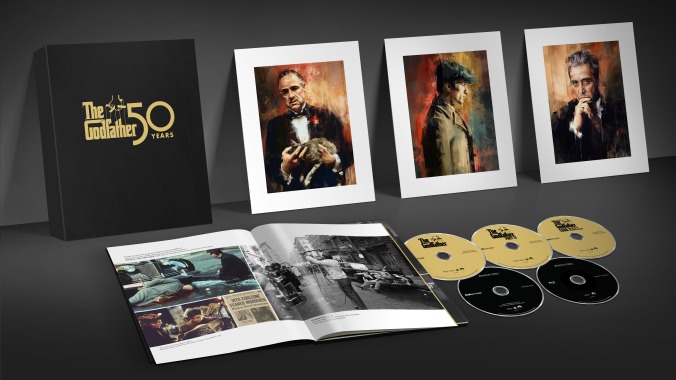Robert Duvall looks back on The Godfather, and the offer he refused for Part III
The Oscar winner reveals what he learned from Coppola and Brando and dissects his complicated relationships, onscreen and off, with the Corleones
Photo: Paramount Home Video
The Godfather trilogy featured a murderer’s row of incredible, even iconic actors, but it’s Robert Duvall who buried all of the bodies in the first two films. Playing Tom Hagen, Duvall was the outsider as insider, wrestling with loyalty to the family that took him in as a teenager as well as the arm’s length distance required while Michael Corleone consolidates and strengthens the family’s criminal empire. That tension feels palpable in Duvall’s performance, and it encapsulates the relationship between legitimate enterprises, the Corleone empire, and the underworld bosses they fight for control.
Duvall recently spoke with The A.V. Club about his work on The Godfather, which commemorates its 50th anniversary this month with a release on digital and on 4K UHD. The Oscar-winning actor discussed his relationships on and off screen with members of the Corleone family, the differences between his acting technique and theirs (in particular, Marlon Brando’s), and his relationship with director Francis Ford Coppola before and after the making of The Godfather Part III, which he famously passed on. Duvall also reflected on the lessons he took from Coppola and other luminaries as he moved into directing himself.
The A.V. Club: It’s hard to say that any character in The Godfather is better written than any other, but Tom Hagen is just so brilliantly crafted—so knowledgeable and skilled, but just on the outside of everything. As an actor, was there anything that you did to maintain that little distance from the rest of the family?
Robert Duvall: As an actor and a character both, you can’t step over the line. He’s an adopted son, so he is a member of the family, kind of; maybe not a thousand percent, but he’s very important to the family. And as an actor, you can’t step over that line either. You have to kind of keep yourself in the background a little bit and then be called upon when needed.
AVC: I understand that at least some of the rehearsal process involved the family sitting down for dinner. What did that teach you about Tom, whether it was where you sat at the table, or just your interactions with the actors playing the rest of the Corleones?
RD: Well, the thing I remember most was that with [Marlon] Brando at the head of the table, the family made sense because Brando was like the head of the family. And in life he was for the most part an actor that so many young actors looked up to in a very intense way. He was “the guy,” so to speak, and we all felt that about him, each in an an individual way.
AVC: The 1970s was just one masterpiece after another, but was there any sense while filming The Godfather that it would have this longevity and legacy?
RD: Well, I’ve only felt that twice. I felt that about a third of the way through Godfather. I said, “we’re really doing something I think pretty special here that will live on for a long time to come.” I felt that we were making a really important film.
AVC: Do you have a favorite scene from the film?
 Keep scrolling for more great stories.
Keep scrolling for more great stories.
